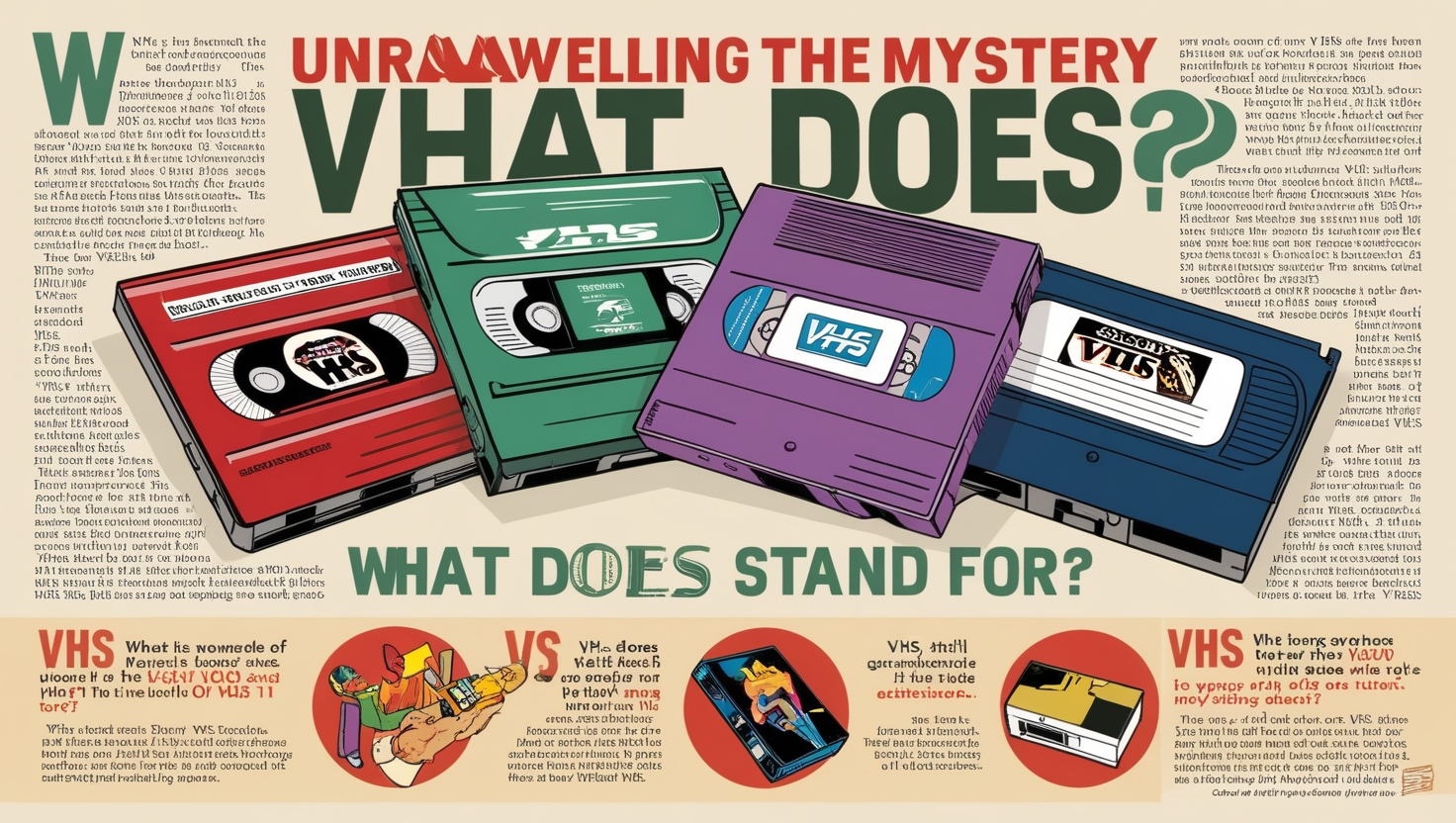Introduction:
The history of home entertainment can only be told with the revolutionary VHS format. But what does VHS stand for, and how did it change the way people consumed video content? This article explores the origins, technical features, and lasting impact of VHS, ensuring a complete understanding of what does VHS stand for in the world of technology and entertainment.
What Does VHS Stand For?
VHS stands for Video Home System, a groundbreaking video recording and playback technology introduced by JVC (Japan Victor Company) in 1976. At its core, understanding what does VHS stand for highlights the vision of bringing accessible, high-quality video technology into the homes of everyday people. Before VHS, video recording was primarily limited to professionals and institutions due to the high cost and complexity of existing formats.
By coining the term “Video Home System,” JVC made it clear what does VHS stand for: a user-friendly, affordable solution that would forever change home entertainment. This innovation allowed consumers to record, watch, and share videos like never before, setting a new standard in the industry.
The Origins of VHS
To fully grasp what does VHS stand for, it’s essential to trace its origins. During the early 1970s, JVC aimed to develop a consumer-friendly video recording system. They envisioned a product that would answer the question, “what does VHS stand for?” by creating a device capable of delivering high performance at an affordable price.
In 1976, JVC launched the VHS format, which quickly became a household name. This development directly challenged Sony’s Betamax format, sparking one of the most famous rivalries in tech history. The battle between Betamax and VHS defined what does VHS stand for in terms of practicality, convenience, and dominance in the market.
What Made VHS Unique?
The technical design of VHS tapes and players played a crucial role in defining what does VHS stand for. A VHS tape comprised a plastic cassette housing a reel of magnetic tape that could store hours of video. With the capacity to record up to six hours of footage, VHS provided unmatched convenience, outpacing its competitors in usability.
The simplicity of VHS players also contributed to their success. By making recording, playing, and rewinding easy for users of all ages, JVC ensured that the answer to “what does VHS stand for” would resonate with consumers worldwide. It wasn’t just about technology; it was about accessibility and practicality.
VHS in the Marketplace
Understanding what does VHS stand for also involves recognizing its significance in the global market. Throughout the 1980s and 1990s, VHS tapes became an integral part of home entertainment. Families used VHS recorders to capture TV shows, rent movies, and preserve personal memories.
The phrase “what does VHS stand for” became synonymous with a cultural revolution as video rental stores flourished. These stores, offering everything from Hollywood blockbusters to indie films, showcased the dominance of VHS. Renting movies became a weekend ritual for millions, cementing VHS as the cornerstone of entertainment.
The Competition: Betamax vs. VHS
When discussing what does VHS stand for, it’s impossible to ignore its competition with Betamax. Sony’s Betamax offered slightly better video quality but failed to match the recording time and affordability of VHS. This critical difference helped VHS capture the market and become the definitive answer to “what does VHS stand for” in the eyes of consumers.
Betamax eventually faded, while VHS reigned supreme for decades. This victory underscored the importance of understanding what does VHS stand for—not just in terms of its name but also in its practicality and mass appeal.
The Decline of VHS
Despite its dominance, VHS began to decline in the late 1990s as DVDs emerged as a superior alternative. Offering better video and audio quality, along with additional features like subtitles and interactive menus, DVDs quickly replaced VHS tapes. By the early 2000s, the question “what does VHS stand for” became a nostalgic query rather than a relevant one.
The final blow came with the rise of digital streaming platforms. Services like Netflix and YouTube revolutionized content consumption, making physical media almost obsolete. The answer to “what does VHS stand for” shifted from a current technology to a historical milestone.
The Legacy of VHS
Even as VHS became outdated, its legacy remains undeniable. For a generation, “what does VHS stand for” evokes memories of family movie nights, rewinding tapes, and the excitement of visiting video rental stores. VHS tapes are now collector’s items, and the format is celebrated by enthusiasts who appreciate its historical significance.
The importance of understanding what does VHS stand for extends beyond nostalgia. VHS paved the way for modern home entertainment, proving that advanced technology could be accessible to everyone. It also influenced media consumption, shaping the foundations of streaming and on-demand video.
What Does VHS Stand For in Today’s World?
While “what does VHS stand for” may now seem outdated, its influence resonates in modern media technology. Concepts like personal video recording, time-shifting, and video rentals trace back to the VHS era. The format’s success demonstrated the power of user-friendly technology and its ability to shape consumer behavior.
The question “What does VHS stand for?”also serves as a reminder of how quickly technology is developing.Once the pinnacle of innovation, VHS has become a relic of the past, illustrating the transient nature of technological progress.
Conclusion
In conclusion, understanding what VHS stands for goes beyond its literal meaning of Video Home System. VHS represented a technological revolution that brought video recording and playback into the homes of millions. Its affordability, practicality, and widespread adoption made it a defining feature of late 20th-century entertainment.
Although it has been replaced by more advanced formats, VHS’s legacy endures. The question “what does VHS stand for” encapsulates not only a name but also an era of innovation and cultural significance. For those who lived through its dominance, VHS will always stand for more than just technology—it will represent a time when video entertainment truly became a part of everyday life.
READ MORE: Mirror Folder 42GB
